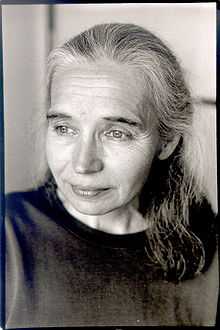Alison Des Forges
| Alison Des Forges | |
|---|---|
 | |
| Born |
Alison B. Liebhafsky August 20, 1942 Schenectady, New York, United States[1] |
| Died |
February 12, 2009 (aged 66)[1] Clarence Center, New York, United States |
Cause of death | Colgan Air Flight 3407 crash |
| Nationality | American |
| Education | B.A., M.A., PhD (history)[1] |
| Alma mater |
Radcliffe Yale[1] |
| Known for | Human rights activism |
| Spouse(s) | Roger V. Des Forges (m. 1964–2009)[2] |
| Children | 2[1] |
Alison Des Forges (née Liebhafsky) (August 20, 1942 – February 12, 2009) was an American historian and human rights activist who specialized in the African Great Lakes region, particularly the 1994 Rwandan Genocide. At the time of her death, she was a senior advisor for the African continent at Human Rights Watch.
Life
Des Forges was born Alison B. Liebhafsky on August 20, 1942, to Sybil Small and Herman A. Liebhafsky. She married Roger Des Forges, a historian at the State University of New York at Buffalo who specialized in China, in 1964. Des Forges earned her B.A. in history from Radcliffe College in 1964, and her M.A. and a PhD in the same discipline from Yale University in 1966 and 1972. Her master's thesis and doctoral dissertation both addressed the impact of European colonialism on Rwanda.[1][2][3] Defeat Is the Only Bad News: Rwanda under Musinga, 1896–1931, her dissertation, was published posthumously in 2011. Describing the politics of the court during the reign of Yuhi Musinga, it shows how divisions among different groups in Rwanda shaped their responses to colonial governments, missionaries and traders.
She specialized in the African Great Lakes region and studied the Rwandan Genocide. She was also an authority on human rights violations in the Democratic Republic of Congo and in Burundi.[4]
Des Forges left academia in 1994 in response to the Rwandan Genocide, to work full-time on human rights.[5] She was named a MacArthur Fellow in 1999, and became the senior advisor at Human Rights Watch for the African continent.
She died on February 12, 2009, in the air crash of Continental Connection Flight 3407, en route from Newark, New Jersey, to her home in Buffalo, New York.[1]
Witness to Rwandan Genocide
In April 1994, she was one of the first outsiders to observe that a full-blown genocide was under way in Rwanda, and afterwards led a team of researchers to establish the facts.[6] She testified 11 times before the International Criminal Tribunal for Rwanda, and gave evidence about the Rwandan Genocide to panels of the French National Assembly, the Belgian Senate, the US Congress, the Organisation of African Unity, and the United Nations.[3]
She wrote the 1999 book Leave None to Tell the Story, which The Economist[6] and The New York Times[1] both describe as the definitive account of the Rwandan genocide. In the book, she argued that the genocide was organized by the Hutu-dominated Rwandan government at the time, rather than being a spontaneous outbreak of tribal conflicts.[4] Africanist René Lemarchand states, "That the story of Rwanda is at all known in the United States today owes much to the work of Philip Gourevitch and Alison Des Forges."[7]
Bibliography
- Des Forges, Alison. Defeat Is the Only Bad News: Rwanda under Musiinga, 1896–1931 (1972; 2011).
- Des Forges, Alison. Leave None to Tell the Story: Genocide in Rwanda – Human Rights Watch et FIDH – 1999 – ISBN 1-56432-171-1.
- Roth, Kenneth; DesForges, Alison (Summer 2002). "Justice or Therapy?". Boston Review.
References
- ↑ 1.0 1.1 1.2 1.3 1.4 1.5 1.6 1.7 Chan, Sewell (2009-02-13). "Alison Des Forges, Human Rights Advocate, Is Dead at 66". New York Times. Retrieved February 13, 2009.
- ↑ 2.0 2.1 "9/11 widow, MacArthur Fellow, jazz musicians among victims" (2009-02-13). USA Today. Retrieved February 13, 2009.
- ↑ 3.0 3.1 "Alison Des Forges". hrw.org. Human Rights Watch. Archived from the original on February 12, 2009. Retrieved February 13, 2009.
- ↑ 4.0 4.1 Bigg, Matthew (February 13, 2009). "Key human rights advocate dies in U.S. plane crash". Thomson Reuters. Reuters. Archived from the original on February 16, 2009. Retrieved February 14, 2009.
- ↑ "Alison des Forges". United States Holocaust Memorial Museum. Retrieved February 13, 2009.
- ↑ 6.0 6.1 "Obituary, Alison Des Forges". The Economist. February 19, 2009. p. 88. Archived from the original on February 27, 2009. Retrieved March 6, 2009.
- ↑ Lemarchand, René (2009). The Dynamics of Violence in Central Africa. Philadelphia: University of Pennsylvania Press. p. 88. ISBN 978-0-8122-4120-4.
External links
| Wikimedia Commons has media related to Alison Des Forges. |
- Bio at Human Rights Watch website
- Tribute at Human Rights Watch website
- PBS Frontline: Ghosts of Rwanda interview with Alison Des Forges
- Obituary: Alison Des Forges, The Economist, February 19, 2009
- Defeat Is the Only Bad News
- Alison Des Forges (née Liebhafsky), Index to the Derscheid Collection Reels
|